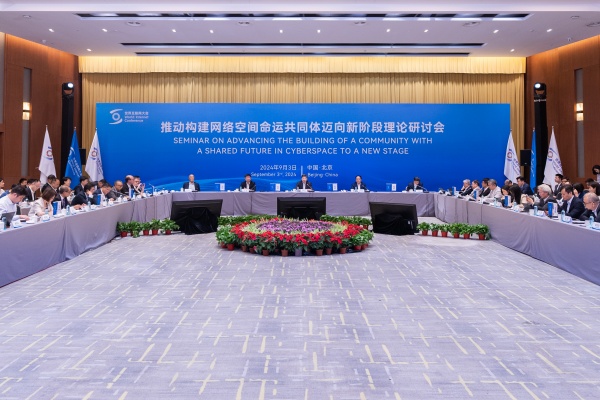
- Home
- Media Center
-
Events
- Wuzhen Summit
- Regional Forums
- Practice Cases of Jointly Building a Community with a Shared Future in Cyberspace
- World Internet Conference Awards for Pioneering Science and Technology
- The Light of Internet Expo
- Straight to Wuzhen Competition
- Global Youth Leadership Program
- WIC Distinguished Contribution Award
- Membership
- Research & Cooperation
- Digital Academy
-
Reports
- Collection of cases on Jointly Building a Community with a Shared Future in Cyberspace
- Collection of Shortlisted Achievements of World Internet Conference Awards for Pioneering Science and Technology
- Reports on Artificial Intelligence
- Reports on Cross—Border E—Commerce
- Reports on Data
- Outcomes of Think Tank Cooperation Program
- Series on Sovereignty in Cyberspace Theory and Practice
- Other Achievements
- About WIC
- 中文 | EN

From vision to mission: Cyberspace community comes to new stage

The WIC holds the Seminar on Advancing the Building of a Community with a Shared Future in Cyberspace to a New Stage in Beijing on Sept 3. [Photo/wicinternet.org]
In line with Chinese President Xi Jinping’s call to jointly advance the building of a community with a shared future in cyberspace to a new stage at the opening ceremony of the 2023 World Internet Conference (WIC) Wuzhen Summit, the WIC hosted a themed seminar in Beijing on Sept 3.
The event, Seminar on Advancing the Building of a Community with a Shared Future in Cyberspace to a New Stage, attracted the participation of prominent experts and industrial leaders in the internet field from China, South Korea, the United Kingdom, France, Switzerland, and Australia.
Together they reviewed the theoretical outcomes and practical experiences accumulated over the past years in building a community with a shared future in cyberspace, diving into the profound connotations, significance, and contemporary value of jointly advancing the cause to a new stage.
Topics under discussion at the seminar included the global significance of building a community with a shared future in cyberspace; construction, development and utilization of digital infrastructure; online cultural exchanges and sharing, and mutual learning among civilizations; innovative development of digital economy and achievements sharing; international cooperation on cybersecurity; and global governance of cyberspace.
The seminar highlighted the significance of the vision of building a community with a shared future in cyberspace, which is composed of a series of discourses on cyberspace governance made by Xi, including Four Principles, Five Proposals, Four Commons, and Three Advocacies. The vision, centering on global internet governance, dug into the opportunities and challenges in cyberspace, and offered a comprehensive framework for building a cyberspace community, according to the seminar.
The seminar emphasized that in the face of unprecedented global, epochal, and historical changes, the internet is becoming a new driving force for development, a new frontier for security, and a new bridge for cultural exchange.
Advancing the vision to a new stage, the seminar called on all stakeholders to seize this new opportunity to drive development, advance cyberspace prosperity, tackle emerging security challenges, and uphold peace and stability. It emphasized the importance of establishing a new governance framework to uphold fairness and justice in cyberspace. The vision of a community with a shared future should guide efforts to enhance the sharing of global achievements in cyberspace, make the internet a force for good and deliver more benefits to people worldwide, and ultimately foster a better future for humanity, the seminar noted.
Speakers at the seminar included Kilnam Chon, professor emeritus of Korea Advanced Institute of Science and Technology and “Father of Internet in South Korea”; Wu Hequan, academician of the Chinese Academy of Engineering; David W. Ferguson, honorary chief English editor of Foreign Languages Press, CICG; Li Junru, former vice-president of the Party School of the CPC Central Committee; Wu Jianping, academician of the Chinese Academy of Engineering and director of Zhongguancun Laboratory; Ke Ruiwen, chairman of China Telecom; Shing Chow, CEO of Lalamove; David Gosset, founder of the China-Europe-America Global Initiative; Zeng Yi, member of UN high-level advisory body on artificial intelligence and director of the International Research Center for Al Ethics and Governance at Chinese Academy of Sciences’ Institute of Automation; Xu Bu, member of the UN secretary-general’s high-level advisory board on effective multilateralism and chairman of Institute for Global Development at Jiangsu University; and Huang Zhixiong, professor of the International Law Research Institute, vice-dean of the Law School and director of the Institute for Cyber Governance at Wuhan University. Jovan Kurbalija, former co-executive director of the secretariat of the UN high-level panel on digital cooperation, and Michael MacLean, fellow of the Academy of the Humanities of Australia, joined the seminar online.
Representatives from WIC senior member enterprises, including IBM, SAP, Intel, Nokia, Tesla, China Unicom, 360, Pinduoduo, Ping An Insurance, Baidu, Alibaba, Tencent, Lenovo, Yinxiang Biji, along with scholars from the Chinese Academy of Social Sciences, the Chinese People’s Institute of Foreign Affairs, China University of Political Science and Law, and Fudan University, attended the seminar.
Zhuang Rongwen, minister of the Cyberspace Administration of China and chair of the WIC, delivered the closing remarks at the seminar, which also saw attendance of Wang Song, vice-minister of the Cyberspace Administration of China. The seminar was chaired by Ren Xianliang, secretary-general of the WIC.

The World Internet Conference (WIC) was established as an international organization on July 12, 2022, headquartered in Beijing, China. It was jointly initiated by Global System for Mobile Communication Association (GSMA), National Computer Network Emergency Response Technical Team/Coordination Center of China (CNCERT), China Internet Network Information Center (CNNIC), Alibaba Group, Tencent, and Zhijiang Lab.





